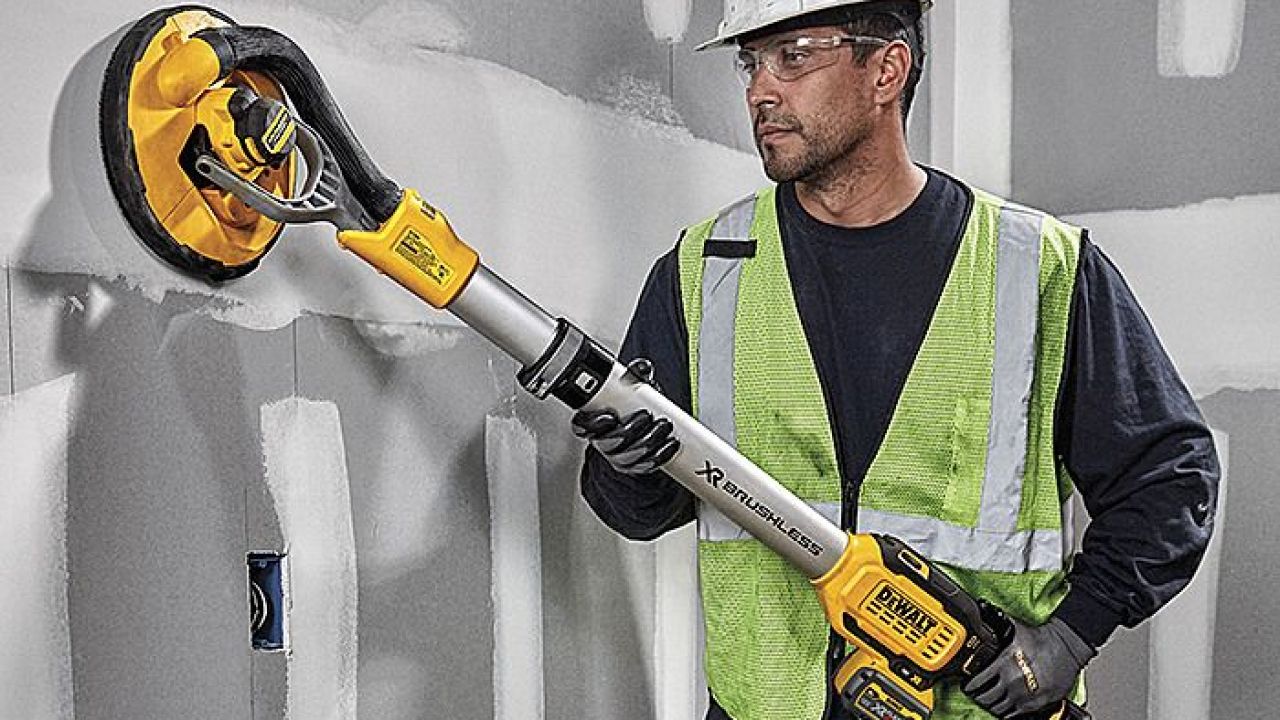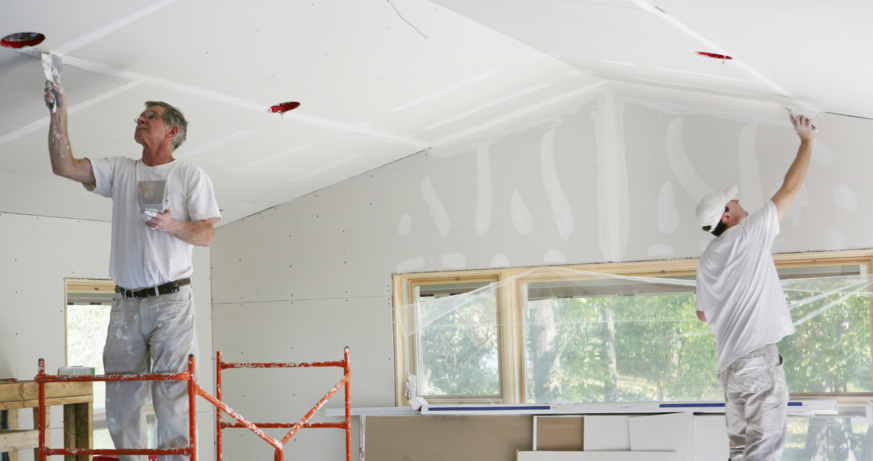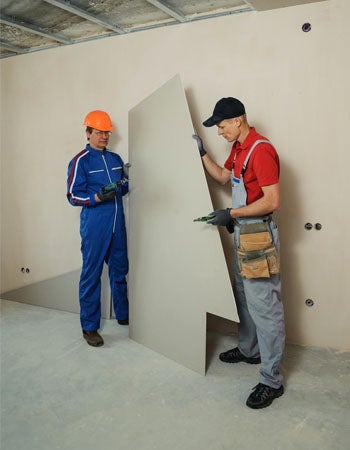
Drywall installers, also called drywall framers, are skilled professionals who install drywall in homes and other buildings. A variety of tasks are required for a drywall installer, such as measuring and cutting drywall or preparing a smooth surface to paint. The job of a drywall installer includes the installation and repair of drywall and light fixture installations.
There are many options for becoming a drywall contractor. Regardless of the path you choose, you'll be helping to make a difference in people's lives.
Drywall installation can be physically demanding and requires focus, flexibility and attention to detail. Installers are often required to stand for long periods of work, both indoors and out. They may also have to lift heavy materials or use specialized equipment. Some installers have to deal with asbestos.

While a degree is not required in order to become a drywall installer, it can be helpful. It will provide the required skills in safety and math. Also, many employers prefer a degree. The result is that a drywall installer can go up in the ranks after having gained enough experience.
The construction industry has become increasingly specialized. For example, a drywall installer may have to lift and conceal heavy panels of drywall for a ceiling. The drywall installer will need to measure and cut the drywall to fit into the wall's frame. A wall installer should have great physical stamina.
The typical drywall installer works 40 hours per week. They are permitted to work extra during weekends and busy periods. Before they can enter the United States, drywall contractors must pass an I-9 immigration document verification exam.
If you plan to become a drywall contractor, you should have strong ethics and personal responsibility. A drywall installer should be able and willing to communicate with clients or coworkers. Because the job is physically demanding, drywall installers must also be able to solve problems.

If you're interested in this career, you can earn great pay. Construction workers are in high demand. They can be hired to renovate and build new structures. However, the demand for skilled craftspeople is growing. There are a lack of skilled crafts professionals in many areas. This is a great situation because it means skilled craftspeople have plenty of work.
Trades careers offer many benefits, not only the high pay but also a wide range of other benefits. Many people love working outdoors. Moreover, there is no student debt involved, which can allow someone to start earning money sooner. The construction industry is also merit-based which means that there are many opportunities for advancement. It doesn't matter if your goal is to become a drywall or plasterer. You'll love the challenge and help build better communities.
FAQ
Is it better to finish floors or walls first?
The best way for any project to get started is to decide what you want. It is essential to consider how the space will be used, who will use it, and why. This will help determine if flooring or wall coverings are best.
You can choose to put flooring in the first place if you decide to open up your kitchen/living space. Wall coverings are an option if you prefer to keep this space private.
Is it more cost-effective to hire a subcontractor or a general contractor?
Hiring a general contractor is usually more expensive than hiring a subcontractor. A general contractor often has many workers, which means they can charge their clients more for labor. Subcontractors, on the contrary, hire one employee and charge less per hour.
Is it worth the extra cost to build or remodel a house?
There are two options if your goal is to build a new home. A pre-built home is another option. This type home is already constructed and ready for you to move in. You could also build your dream home. With this option, you'll need to hire a builder to help you design and build your dream home.
Cost of building a home is determined by how much time you spend planning and designing it. Because you will likely be doing most of the work yourself, a custom home can require more effort. You also have greater control over the materials and their placement. It might be easier to find a contractor that specializes in custom-built homes.
A new home can be more costly than a remodelled home. The reason is that you'll need to pay more for the land, as well any improvements. Permits and inspections are also required. The price difference between a newly built and remodeled home averages $10,000-$20,000.
Statistics
- They'll usually lend up to 90% of your home's "as-completed" value, but no more than $424,100 in most locales or $636,150 in high-cost areas. (kiplinger.com)
- A final payment of, say, 5% to 10% will be due when the space is livable and usable (your contract probably will say "substantial completion"). (kiplinger.com)
- Design-builders may ask for a down payment of up to 25% or 33% of the job cost, says the NARI. (kiplinger.com)
- The average fixed rate for a home-equity loan was recently 5.27%, and the average variable rate for a HELOC was 5.49%, according to Bankrate.com. (kiplinger.com)
- According to the National Association of the Remodeling Industry's 2019 remodeling impact report , realtors estimate that homeowners can recover 59% of the cost of a complete kitchen renovation if they sell their home. (bhg.com)
External Links
How To
Five Things You Need to Know Before You Begin Your Home Renovation
-
Do you really want this? If you're planning on embarking on major home improvement projects like renovating your kitchen, bathroom, or building a brand new house, it's certain that you'll need to have some assistance. However, if you feel unsure about your ability to complete such a big task by yourself, you might consider hiring someone to help you. It can take up your time and cost you money. You won't reap the benefits. Hire someone who knows the ropes to help you. They'll save your time and make it easy for you to have a wonderful place to call home.
-
How much should you spend? This one may seem obvious, however spending too much on renovation projects could make matters worse. It's because you'll most likely be responsible for paying back the majority of the costs. So if you've got a budget in mind, stick to it! If you don't, you might end up spending a lot of money and not receiving anything.
-
Do I prefer to hire professionals or DIY? - While there is no right or wrong answer, we recommend that you hire professional tradespeople if possible. After all, they'll be able to give you advice on how best to proceed with your project. They'll install your plumbing correctly, provide a warranty, and ensure everything goes according to plan. DIY projects often involve a lot trial and error. You'll learn a lot the hard way. Plus, you'll have to deal with all sorts of problems that arise during the process.
-
What are my options? - Don't underestimate what a renovation will cost. Even if the project seems manageable, it could prove costly and you will need to borrow money. When you want to sell your existing property quickly after the renovations are complete, you will need to account for the price of selling it.
-
Which place should I start? - When it comes to choosing where to start, there's no right or wrong place. We suggest you choose something you like to do. This will help you stay motivated and make it less likely that you procrastinate. Also, try to avoid places that require a lot of maintenance. If your living area is constantly cluttered with dust and dirt, you should not attempt to redesign it.